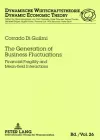
The Generation of Business Fluctuations
Corrado Di Guilmi - Paperback
£37.70
Corrado Di Guilmi earned his Ph.D. in Economics from Università Politecnica delle Marche, Ancona, Italy in 2008. He is currently working as Senior Lecturer in the Economics Discipline Group of the University of Technology, Sydney. He is associate editor of the Review of Keynesian Economics and of Complexity Economics. He was visiting fellow at the Department of Economics of the University of Cambridge, the Department of Applied Mathematics of the Australia National University, the New School for Social Research in New York. His research interests include business cycle, agent-based modelling, nonlinear modelling applications in economics of complex system theory and Post-Keynesian economics. Mauro Gallegati is Professor of Advanced Macroeconomics at the Università Politecnica delle Marche, Italy. He obtained his Ph.D. in Economics from the Università degli Studi di Ancona, Italy in 1989. He has been visiting professor in several universities including Stanford University, Columbia University and Massachusetts Institute of Technology. His research includes business fluctuations, econophysics, nonlinear dynamics, models of financial fragility and heterogeneous interacting agents. He published papers in economic, history of economy and history of economic analysis, nonlinear math, applied economics and econophysics. Simone Landini earned his Doctoral Degree in Mathematics from the University of Milano Bicocca, Italy in 2006. He is a researcher at the Istituto di Ricerche Economico Sociali del Piemonte (IRES Piemonte), Turin, Italy. He has been visiting Fellow at the Faculty of Business at the University of Technology, Sydney. His research interests include macroeconomics, dynamics of industrial and banking sectors, the financial fragility of economic systems, income and wealth distribution, financial markets analysis and microstructure, agent based modelling and their analytical solution, statistical physics and econometric applications to social and regional sciences.